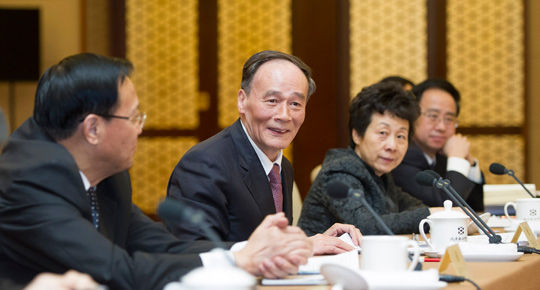Anti-corruption chief Wang Qishan traveled to Zhejiang for an inspection tour, where he announced plans to intensify the anti-corruption campaign:
As the countercorruption campaign shifts up a gear, anti-graft chief Wang Qishan vowed to “awaken the awareness of discipline and rules among Party members”.
Wang, head of the Communist Party of China (CPC) Central Commission for Discipline Inspection (CCDI), made the remarks during an inspection trip to coastal Zhejiang Province that ended on Sunday.
Wang also pledged to enhance institutional innovation and let discipline and rules take the lead in the anti-graft campaign. [Source]
The CCDI has also called on local officials to step up their vigilance in fighting corruption in their own areas, as Keira Lu Huang reports for the South China Morning Post:
The article by the Central Commission for Discipline Inspection said some local officials were promoted despite being corrupt because of the local disciplinary watchdog and party cadres’ oversight.
“Regarding the anti-corruption campaign, would it ever be possible to just rely on the central government to put in all the effort?” read the article.
It said most of the senior officials detained in the graft investigation had been corrupt since they were in lower-level positions, and urged all levels of graft-busters to use the CCDI’s inspection tour system to uncover problems to build a better political ecosystem from the bottom up.
“It’s a crucial point and could affect the whole campaign,” the article said. [Source]
Some local governments have responded to pronouncements from Beijing by issuing new rules targeting slackness among officials. Angela Meng at SCMP reports:
The move – which has seen governments roll out trial regulations to define and punish slack officials – follows Premier Li Keqiang’s criticism of lazy officials during the annual parliamentary sessions in March.
The official People’s Daily reported that these rules defined slackness in three categories: inaction, passiveness, or launching ill-conceived measures.
Failing to implement a superior government’s policies, delays in protecting citizens’ rights, evading responsibilities for fear of offending other officials, and pressing ahead with white-elephant projects are among the definitions of slackness.
Foshan in Guangdong province was among the first cities to announce last month the seven criteria that identify a slack official. The city’s party committee said it would issue three levels of written warnings and even fire or demote officials. [Source]
Read more about President Xi Jinping’s anti-corruption campaign, via CDT.







